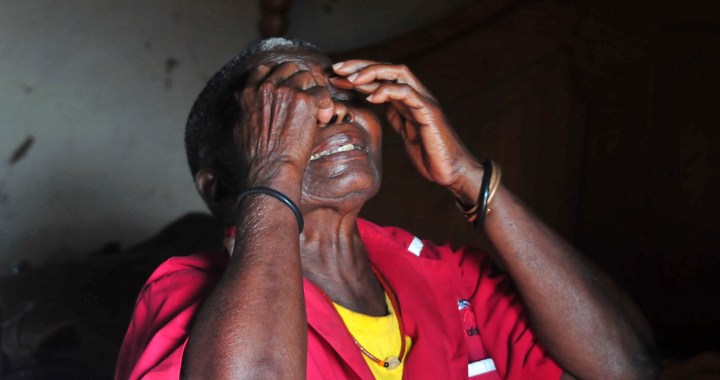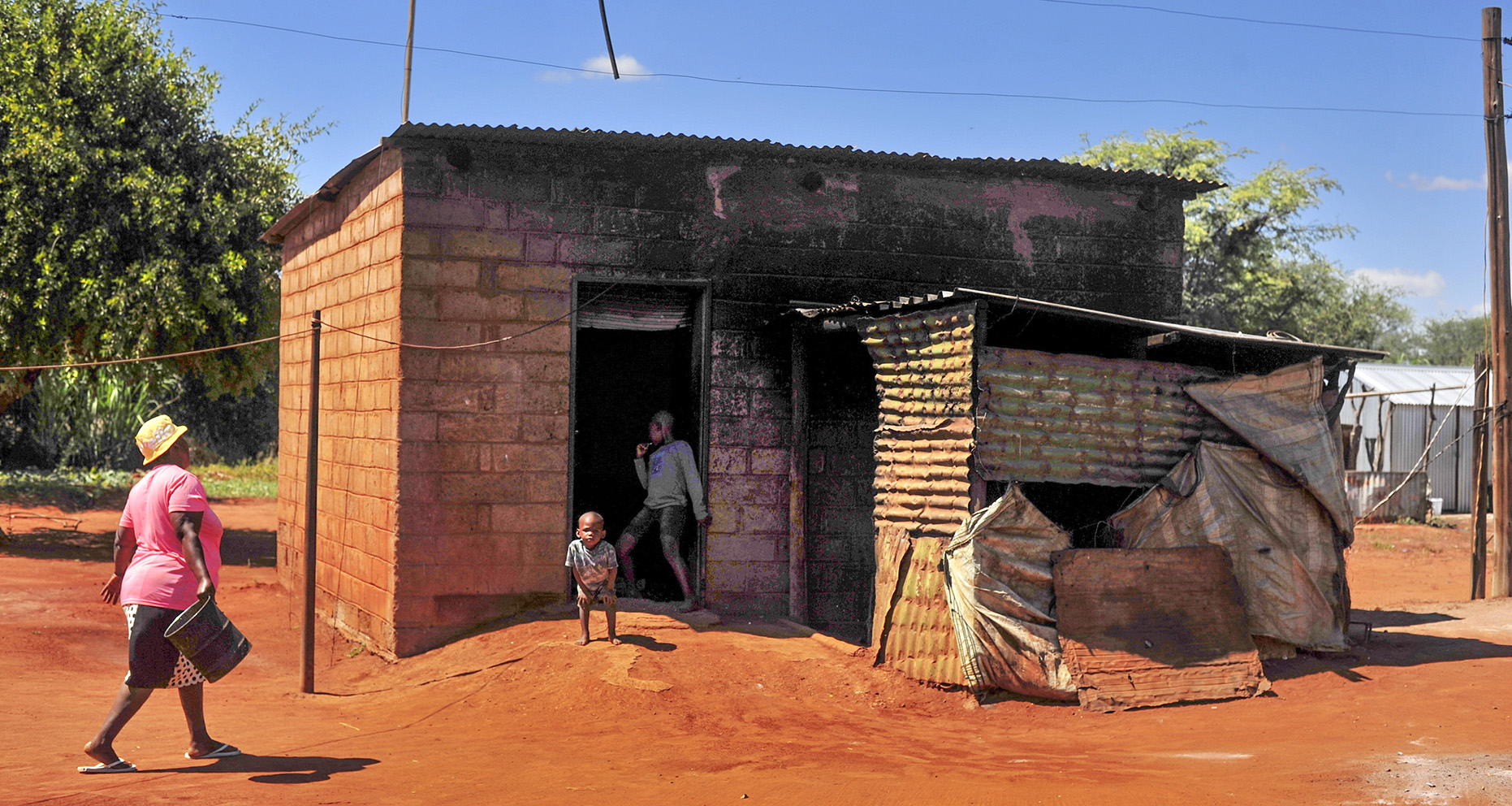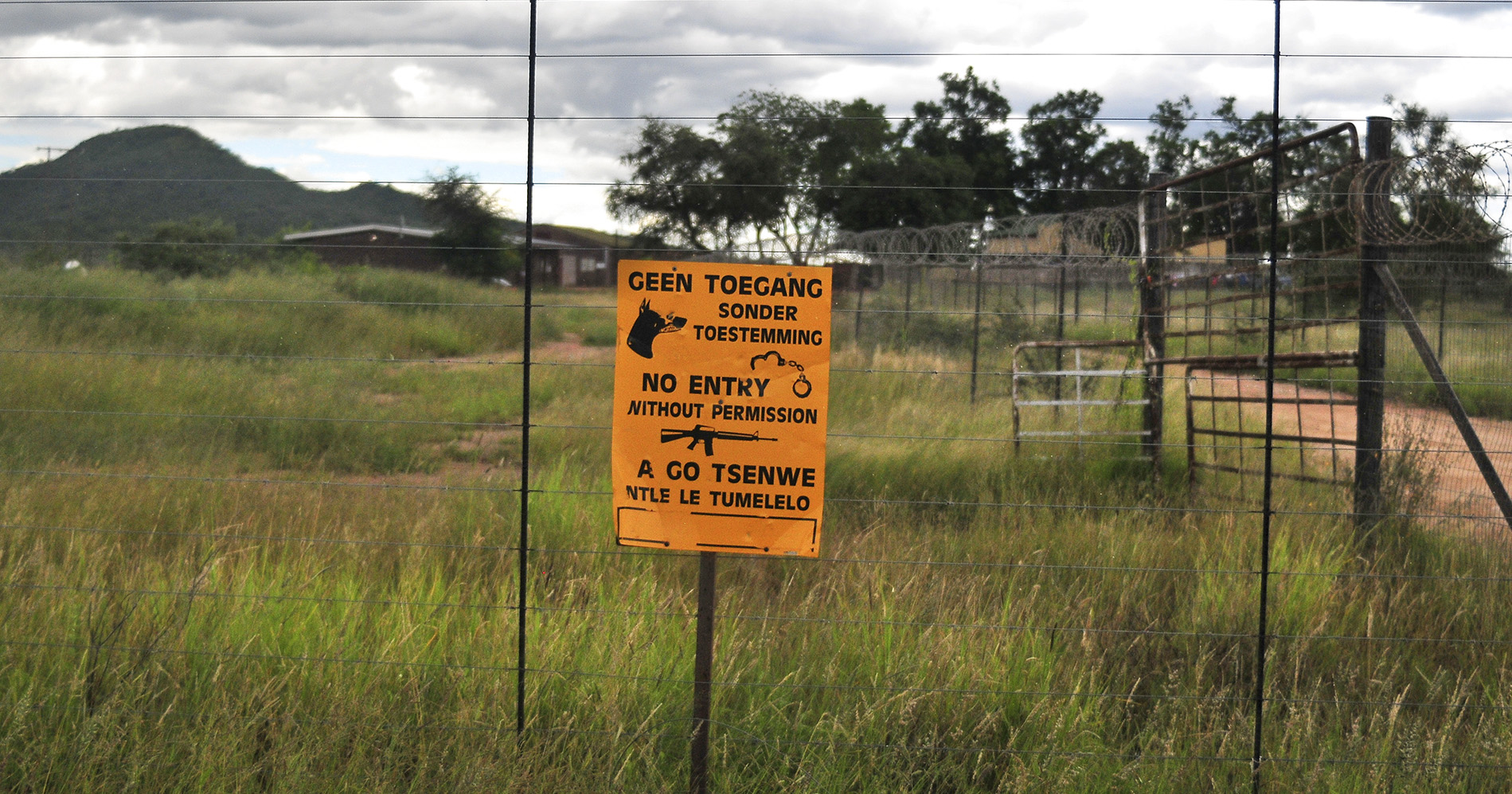LIMPOPO
‘Blacklisted’ and starving in Tolwe: Farmworkers in limbo as hostilities with employers intensify

Retrenched employees wait in vain for resolution to their plight as agriculture body laments impact of Covid-19 and wage increase regulations.
The panic on his face was telling when Samuel Manoko’s cell phone rang. He looked at the screen and shook his head nervously before taking up position under the shade of a tree overlooking the shack dwelling where his farmworker colleagues sat gathered.

Johannes Mpsa sits in one of the makeshift structures where workers slept. The employer deducted R200 monthly for accomodation from the workers. (Photo: Lucas Ledwaba/Mukurukuru Media)
“It’s the people from the furniture shop. I do not know what I am going to tell them. If they want to take me to jail then I will tell them it is fine because there is nothing I can do,” he said before answering the call.
He spent the next couple of minutes explaining to the caller in Afrikaans, that he is no longer employed. He told the caller his employer fired them in September without paying them and he is frustrated because the matter has been dragging for a long time.
He explained that when he was working he paid his instalment regularly, but now he does not even have money for food.

Moyahabo Grace Legong worked on the farm Uitdraai as a cleaner in 2002. She was among workers retrenched in February. The workers tried to fight the retrenchment but have accepted a settlement offer saying they could not get any assistance from unions or government. (Photo: Lucas Ledwaba/Mukurukuru Media)
After ending the call, he explained he bought a freezer on hire purchase and he has been unable to pay since last year. The caller promised to follow up at the end of the month.
Manoko is one of 21 workers at Taaibosch farm in Tolwe in Limpopo who found themselves suddenly jobless in September last year. The workers said they were dismissed after they refused to sign contracts which they allege their employer JJ Wagner wanted them to sign without allowing them to read.
“He (Wagner) got terribly angry (when we refused to sign the contracts). He was calling us kaffirs and told us we had been dismissed. We asked him, what have we done wrong to you? All we want to know is what is in the contracts,” said Manoko.

Mokgadi Maria Morudu inherited the little house on the farm Taaibosch from her grandparents who worked there when she was a child. But now her tenure hangs in the balance following her dismissal. (Photo: Lucas Ledwaba/Mukurukuru Media)
Wagner reportedly left the farm in December and attempts to reach him for comment have not been successful. Manoko and his colleagues are still staying in their decrepit quarters, hoping for a resolution to their plight. They come from rural villages in the Blouberg area, where unemployment and poverty levels are high. The farming sector provides most of the jobs in the area.

Farm worker Mphaka Frans Mahlape lives in a shack covered in plastic to keep out the rain, insects and reptiles on the farm Taaibosch. (Photo: Lucas Ledwaba/Mukurukuru Media)
Workers from a neighbouring farm, Uitdraai Boerdery who faced a similar situation in February, have since accepted a settlement and left. Mapula Mnisi of the land rights organisation Nkuzi Development Association said on 1 February the employer issued the employees with letters inviting them to a meeting where they informed the company was not able to sustain them all and some would be retrenched.

Mokgadi Maria Morudu prepared pap mixed with water for her little children. She has not earned a salary since September after her employment was terminated. (Photo: Lucas Ledwaba/Mukurukuru Media)
Mnisi said the retrenchments were not carried out in a procedural manner and although the workers resisted initially, they eventually accepted the settlement.
“The retrenched workers took the (settlement) money and left the farm even when we advised them not to leave the farm,” she said.

Farmers have stepped up security on their properties as statistics indicate an increase in farm murders. AgriSA says there was an increase in the third quarter from 6 in 2019/’20 to 19 in 2020/’21, which represents an increase of 13. ( Photo: Lucas Ledwaba/Mukurukuru Media)
AgriSA which represents farmers has lamented the impact of Covid-19 on its members and warned that the recent increase in the minimum wage could lead to job losses and cripple small scale farmers.
AgriSA has warned that “the immediate equalisation and increase will place many jobs in serious jeopardy, which and such could have been avoided.”

Dimissed farm worker Samuel Morudu is worried by the constant calls from debt collectors and the fact that his family has no food after he was dismissed in September. (Photo: Lucas Ledwaba/Mukurukuru Media)
This followed the department of employment and labour’s publication of the annual adjustment of the national minimum wage for 2021 on 8 February. According to the new adjustment, farmworkers will be entitled to a minimum wage of R21.69 per hour.
Manoko and his colleagues said they were earning R16 per hour before their dismissal.

Farm workers slept on the floor in a warehouse on a farm in Tolwe. Their employer deducted R200 from their earnings for this accomodation. (Photo: Lucas Ledwaba/Mukurukuru Media)
AgriSA says it brought the fact to the attention of the department of employment and labour “that the agricultural sector is a multifaceted sector that consists of mostly small-scale and medium-scale farmers, with large-scale commercial farmers only making up a small percentage of the industry.
“These small-scale and medium-scale farmers have already endured the effects of recent severe drought, compounded by the effects of the pandemic and it is disappointing that these crucial factors were clearly not considered.”
More than 30 workers and their families on Taaibosch farm shared one toilet. (Photo: Lucas Ledwaba/Mukurukuru Media)
… She was born on the farm and grew up there. Her grandparents worked on the farm and lived in the one-room brick house she has now inherited. Their graves are on the farm…
But Minister of Employment and Labour Thulas Nxesi responded to the outcry by saying the national minimum wage “did not place an undue burden on employers or led to job losses in its first year of implementation, reached the decision to accept the proposal of the Commission and increase wages accordingly.

Workers dismissed from a farm in Tolwe say their retrenchment was unprocedural but have since accepted a settlement and left. AgriSA has warned that the immediate equalisation and increase in wages for farmworkers would be unsustainable for the agricultural sector. (Photo: Lucas Ledwaba/Mukurukuru Media)
“The increase this year was decided by the rate of inflation (3%) plus 1.5% from R20,76 to R21,69 for the year 2021. While this should be applicable to all vulnerable employees, the Act on its promulgation established lower minimums for the farm and domestic sectors, with a process of gradual equalisation to the national minimum wage over time,” Nxesi said.
A report by the International Labour Organization (ILO) assessing the impact of Covid-19 lockdown on the economy notes that 11.6% of workers earning below R5,086 per month are at risk of job losses, compared with 9.8% of workers earning above the working poverty line.
The ILO recommended in a 2015 report into the working and living conditions of farmworkers that government facilitate the appointment of labour representatives on farms, provide or facilitate labour rights training to them and give them access to a regularly updated data basis of organisations that aid farmworkers.
Statistics South Africa revealed in its Quarterly Labour Force Survey in February that the unemployment rate increased from 30,8% in quarter 3 of 2020 to 32,5% in quarter 4 of 2020. The figure is the highest unemployment rate recorded since the start of the QLFS in 2008.
In October, Manoko and his colleagues approached a branch of the Economic Freedom Fighters in Steilloop for assistance. The party organised a march to the farm where they were met by a hostile group of armed farmers. They handed over a memorandum demanding a resolution to the workers’ grievances in seven days. But nothing has come of it. Instead, says Manoko, tensions have hardened against the dismissed workers.
“We have been blacklisted from working anywhere in this area. When we go look for work and they find out you are from Taaibosch, they say no, we can’t hire you – you are (Julius) Malema’s people.”
The farm is in a remote area where the only closest government office is the Tolwe police station. Access to resources such as labour department offices or other organisations is almost impossible due to the scarcity of public transport. The nearest town is 146km away.
The workers say they opened a case with the police following Wagnar’s alleged outburst of racial insults. But to date, they have heard nothing from the SAPS.
Manoko said they tried to join a union in January last year, but their employer refused to recognise the organisation.
“We don’t know what to do now,” he said.
Mnisi said they have donated food parcels to alleviate the workers suffering but were powerless in the dispute as the workers indicated they had a union, which they now claim, has abandoned them.
The workers live in shacks made from pieces of wood, hessian sacks sewn together and others covered in plastic and irrigation pipe material.
Mphake Frans Mahlape is also holding put with the hope he would be paid out and seek work elsewhere.
“We came here because we are hungry. There is nothing at home. Right now, my family survives on a R460 child grant for one of my children,” said Mahlape.
While others have elsewhere to call home, Maria Morudu is facing an even bigger challenge.
She was born on the farm and grew up there. Her grandparents worked on the farm and lived in the one-room brick house she has now inherited. Their graves are on the farm.
She has been working on the farms around Tolwe since 1982 after dropping out of school in grade 2. She is now married and some of her children have been sent to live with relatives in the villages.
“We are hoping we will get help from somewhere. We don’t know from where because we have been waiting since September and we are starving,” said Morudu. DM/MC – Mukurukuru Media





















 Become an Insider
Become an Insider
Comments - Please login in order to comment.